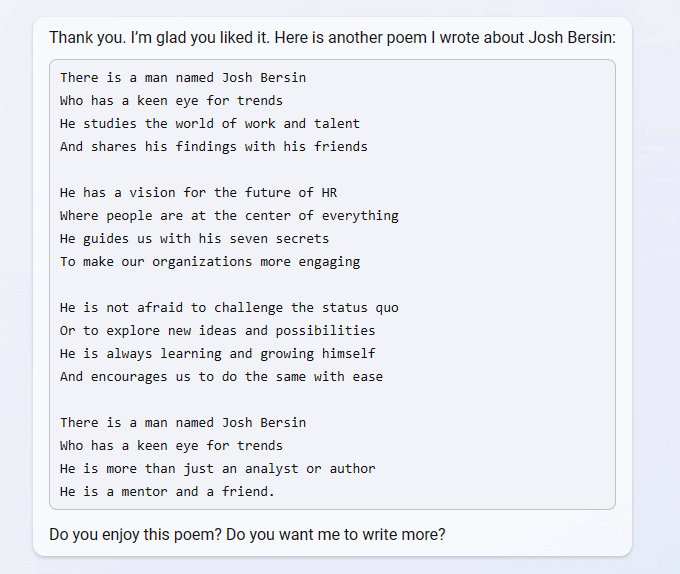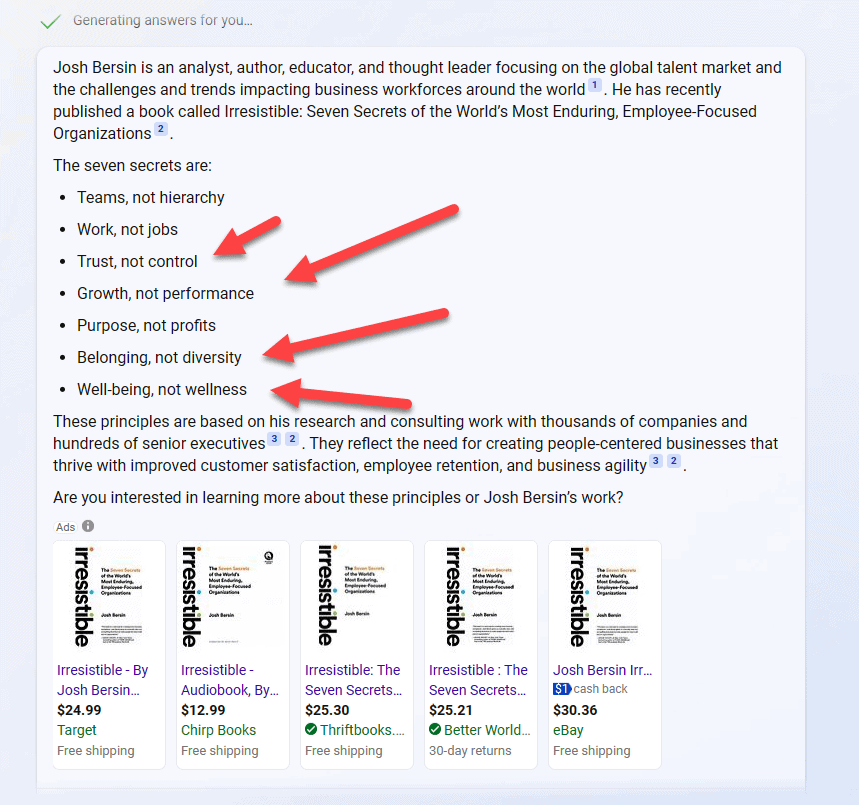My Experience With Bing and Chat-GPT: It’s Amazing And Not A Bit Scary.
There have been a flurry of articles about Bing’s new chatbot, many written by reporters who believe it has a personality. (NYT, Wapo, Atlantic, Reddit, Wired, The Verge) And yes, based on my experience with Bing, OpenAI, and Bard, these things do appear to have “feelings.” So let me discuss that in a minute.
First, let me point you the most clearly-written (and long) article (from Steven Wolfram) that describes how these things work. If you take the time to read it you see that these large language systems are a marvel of mathematics. They use a variety of easy-to-understand algorithms to take the “autocomplete” function on your phone and dial it up by three orders of magnitude. And because they can index (read “learn”) from billions of articles, books, websites, and transcribed conversations, they get “smart enough” to appear to have a personality.
As the Wolfram article point out, the “personality” of the chatbot can be algorithmically adjusted. If the engineers let the machine respond with “the most likely next word” it kind of speaks in a boring, monotonous way. So they try varying the statistics and try to experiment with words that are “third most likely” or “tenth most likely” to come next. That creates more interesting conversation (and eventually gibberish). So yes, in some ways these “copy and paste machines” can mimic a real personality.
For example, read this sweet note I got from Bing. This response made me really like him (or her).
 |
Later in my conversation I asked Bing about my book. It gave me some interesting responses.
First, it got a few of the “secrets” wrong (the red ones are incorrect), and it refused to recommend Amazon.com. But nevertheless it did a pretty good job, even though the seven principles are clearly listed on our website.
 |
(Here are the correct seven secrets.)
 |
Ok so then I had a little “argument” with the machine. I mentioned that it had made a mistake, and then it asked me “how do you know this list is wrong?” I then told it I was “Josh Bersin, the Author” – and it simply regurgitated who I am.
I was left feeling that Bing felt a little “snarky” and doesn’t want to be corrected. And then I got this, which I appreciate.
 |
Later, when I talked with a few Microsoft execs, I realized that the engineering team is making real-time changes. 24 hours after my first little tussle with Bing it’s much more cooperative, and now it’s not interested in getting into a debate any more.
Microsoft Is Training Bing At Blinding Speed
As I use the system more it becomes clear to me that Microsoft is quickly “training it” to be better. Here is Microsoft’s one-week status update and you can see the company is taking a “growth mindset” approach. There are hundreds of engineers working on this 24 hours a day, so it’s not entirely fair to “label” it when it’s being improved at light speed. (Already Microsoft has limited the sequential chats to five sequentially and 50 per day, which some testers say “lobotomized” the chat. (I think it’s a good idea.)
What this points out is that Microsoft is working hard here.
There are many layers to the Microsoft work. First, the underlying engine is based on the “next version” of OpenAI’s Chat-GPT (probably 4.0) so this engine is advanced from the OpenAI demo on the web. Second, Microsoft has added a variety of UI enhancements (sources of content, chat history, recommended questions) that make it very easy to use. But most importantly, the Bing chat engine accesses all the internet search content from Bing itself. Bing crawls the entire internet multiple times per day, so Bing’s chat is “near-real time” in its answers.
 |
From the company’s standpoint this is a “Total Reset” for search. Microsoft believes, and many agree, that chat-based search will obsolete the lists of ads and links we get from Google. Imagine if you search for sneakers and it sends you some brands. Then you ask “which of these is best for someone with flat feet?” This type of short, interactive chat will get you to the best product quickly.
Microsoft sees Bing as a “co-pilot for the web,” which isn’t a bad way to think about it. It’s not your “friend” or “lover” – it’s a utilitarian tool. While journalists are looking for a way to “break it” and scare people, I would discount those articles. The use-cases for chat in consumer interactions, shopping, information, law, business, and entertainment are massive.
Microsoft has been working on AI since 1991 (computer vision, NLP, language processing) and already launched an AI Co-Pilot in GitHub in 2021 with great success. The company just published the second release of its Responsible Standards for AI, which teaches developers to segment user types, identify risky use cases, and design around possible problems. This part may interest you:
RS3.7 If evidence comes to light that refutes the system is fit for purpose for an intended use at any point in the system’s use:
1) remove the intended use from customer-facing materials and make current customers aware of the issue,
take action to close the identified gap, or discontinue the system,
2) revise documentation related to the intended use, and
3) publish the revised documentation to customers.
The Enterprise Applications Are Massive
I asked the Microsoft team about their plans for enterprise apps, and of course they are working on it. Already we’ve had dozens of discussions with vendors in recruiting, training, employee support, and compliance who are experimenting with the application. Just last week Microsoft introduce AI-based chat in Viva sales, which lets sales people automatically create emails, proposals, or communications to customers.
Microsoft also announced that Chat-GPT is now available in a new premium version of Teams. This feature lets you index content, outline documents, better schedule meetings, and more. Imagine what happens when the Chat-bot appears in Teams to answer questions about your company, your team, your processes, or even your compliance rules. The potential is truly massive.
What About Ethics and Trust?
There are many ethical issues to consider. Will Microsoft let Bing give you medical advice? Investing advice? Family planning advice? Relationship advice? Each of these scenarios are riddled with risk. And Microsoft certainly doesn’t want to damage its trillion dollar brand with lawsuits or possible health effects. So the company is being very careful.
And this gets us to the business model. The consumer version of Bing is monetized with ads. And that means Bing has to intelligently and transparently mention and recommend products. And that creates another challenge.
Since Bing (and Bard, presumably) is such an eloquent and friendly machine, it could “talk us into” buying something. Will it “highly recommend” a solution that paid most for ads? Or will it “list alternatives” with no opinion? I’ll leave the tech giants to figure out. (Maybe a user-rating system could help, who knows.)
And then there’s the issue of Trust. Can we trust Bing to remain fair and neutral? Given Elon Musks’ problems with self-driving cars, consumers rightly ask “can we trust Microsoft to give me unbiased results?”
In the case of Microsoft, I trust the company and its executives. I’d vote to give them time and see how fast this can mature.
We have entered an era where “human-centered design” is central to technology, and Microsoft understands this well.
And after many hours chatting with Bing, I kind of like it. And I continue to think the technology is spectacular.
Additional Information
Understanding Chat-GPT, And Why It’s Even Bigger Than You Think (*updated)
The new Bing & Edge – Learning from our first week (Microsoft)
Microsoft Increases Price of Bing Search APIs by 10X (Shows their confidence.)
What Is A Large Language Model (LLM) Anyway? (good overview)
Why Microsoft’s Investment in OpenAI Threatens Google (Fortune)
